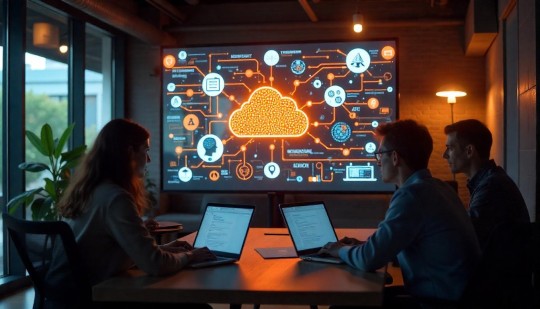#AIandjobs
Explore tagged Tumblr posts
Text
Navigating the Digital Age: Must-Have Skills for the Modern Workplace

The digital age has revolutionized how we work and interact with the world. In today’s technology-driven environment, mastering certain skills is essential not only for business success but also for individuals aiming to navigate their career path effectively. This blog post will explore the most important digital skills that businesses and professionals must develop to remain competitive and successful, while also offering career guidance to help you find the right career aligned with your passion.
1. Digital Literacy
Basic Computer Skills: Proficiency in using common software applications such as Microsoft Office, Google Suite, and email platforms is fundamental. These skills are the foundation of many career paths, and being proficient in them can significantly boost your career development.
Internet Navigation: Understanding how to search for information on the Internet, find credible sources, and use online tools effectively is crucial. This ability is not only vital for career success but also helps you identify and pursue the right career opportunities that match your interests and passion.
Digital Communication: Effective use of email, video conferencing, and social media platforms for business communication is key. Strong digital communication skills are essential for maintaining relationships and collaboration, whether you’re working in a traditional office setting or pursuing a remote career.
2. Technical Communication

Embrace New Technology: Staying up to date with the latest technological developments and being open to learning new software and tools is essential for career growth. In a rapidly evolving digital landscape, these skills can guide you in finding a career path that excites you and aligns with your long-term career goals.
Problem-Solving Skills: The ability to independently identify and resolve technical problems is a valuable asset in any career. These skills not only enhance your problem-solving abilities but also demonstrate your passion for continuous learning and innovation—key traits for career advancement.
3. Data Analysis and Interpretation
Data Literacy: Knowing how to collect, analyze, and interpret data is a key component of making informed decisions. This skill is crucial for career development, especially in fields that rely heavily on data-driven decision-making. Mastering data literacy can open doors to new career paths and help you find the right career that aligns with your analytical strengths.
Data Visualization: The ability to create clear and informative data visualizations using tools such as Excel, Tableau, or Python is highly sought after. This skill allows you to present data insights effectively, aiding in strategic planning and decision-making—a crucial aspect of career success.
Data-Driven Decision Making: Using data to make informed strategic decisions is essential in today’s business environment. This ability is not only vital for business success but also provides you with the career guidance needed to make informed choices about your career path.
4. Cybersecurity Skills

Understanding Cyber Threats: Identifying common cyber threats such as phishing, malware, and ransomware is essential for protecting both personal and professional data. Developing these skills can significantly impact your career path, especially if you’re interested in pursuing a career in cybersecurity.
Data Protection: Implementing best practices to protect personal and sensitive information is crucial for any business or individual. Strong data protection skills not only enhance your professional value but also align with the growing demand for cybersecurity experts—a promising career path.
Follow Cybersecurity Policies: Adhering to company policies and procedures to prevent data breaches is a non-negotiable aspect of modern work. By following these guidelines, you contribute to a secure work environment and bolster your career prospects, especially if you’re passionate about cybersecurity.
5. E-Commerce and Digital Marketing
Understanding Digital Marketing: Basic knowledge of search engine optimization (SEO), social media marketing, and content marketing is increasingly important in the digital economy. These skills can provide valuable career guidance, helping you identify a career path in marketing, sales, or business development that aligns with your passion.
E-Commerce Skills: Familiarity with online marketplaces, payment methods, and customer relationship management (CRM) tools is essential for those looking to pursue a career in the digital marketplace. Whether you’re starting your own online business or working for an established company, these skills are crucial for career development.
Digital Marketing Analytics: Monitoring and analyzing the performance of digital marketing efforts allows businesses to adjust strategies for better results. This data-driven approach to marketing is a valuable skill that can lead to exciting career opportunities, helping you find the right career that matches your interests and strengths.
6. Remote Business Skills

Effective Time Management: Prioritizing and managing tasks efficiently is crucial, especially in a remote work environment. Strong time management skills are essential for maintaining productivity and advancing your career, regardless of where you work.
Communication and Collaboration: Maintaining open and transparent communication with colleagues and clients is vital for successful remote work. These skills ensure that you remain connected and engaged, helping you develop a career path that supports your work-life balance.
Creating a Productive Work Environment: Establishing a healthy and productive home office environment is key to achieving work-life balance and ensuring long-term career success. If you’re passionate about remote work, mastering these skills is essential for your career development.
Conclusion
Developing these essential skills in the digital age is crucial for career success. By focusing on digital literacy, technological transformation, data analytics, cybersecurity, e-commerce, and remote working skills, you can establish yourself as a valuable asset in today’s workplace and confidently navigate your career path.
Guruface: Your Digital Learning Companion
Guruface is a comprehensive platform designed to help individuals and businesses navigate the digital landscape. With a wide range of courses and resources, Guruface offers training and certification programs in various digital skills. Whether you're looking to enhance your existing knowledge, explore a new career path, or find the right career aligned with your passion, Guruface can provide the support and career guidance you need to succeed in the digital age
#DigitalSkills#FutureOfWork#TechSavvy#WorkplaceTrends#CareerGrowth#AIandJobs#RemoteWork#Upskilling#DigitalTransformation#JobSkills#ModernWorkplace#Automation#TechTrends#OnlineLearning#CareerDevelopment
0 notes
Text
The Future of Jobs in the Age of AI

Introduction
The advent of artificial intelligence (AI) has brought about a paradigm shift in various sectors, fundamentally altering how we perceive work. The future of jobs in the age of AI is a topic of significant debate and analysis among experts, policymakers, and the general public. As AI continues to evolve, its impact on employment, skills, and the nature of work itself becomes increasingly profound. This article explores the future of jobs in the age of AI, examining both the opportunities and challenges that lie ahead.
The Current Landscape of AI in the Workforce
Artificial intelligence has already made substantial inroads into the workforce. From manufacturing and healthcare to finance and customer service, AI technologies such as machine learning, natural language processing, and robotics are transforming industries. Automation of routine tasks, enhanced decision-making capabilities, and improved efficiency are just a few examples of how AI is reshaping the workplace.
In manufacturing, robots equipped with AI are performing repetitive tasks with precision and consistency, reducing human error and increasing productivity. In healthcare, AI-powered diagnostic tools are assisting doctors in making more accurate diagnoses and treatment plans. Financial institutions are leveraging AI algorithms to detect fraud, manage risk, and provide personalized financial advice.
The Impact of AI on Employment
https://businesswolfmagazine.com/wp-content/uploads/2024/08/6.Impact-of-AI-on-Employment.jpg
One of the most pressing concerns about the future of jobs in the age of AI is the potential for job displacement. As AI systems become more capable, there is a fear that many jobs currently performed by humans will be automated. This has already been observed in industries such as manufacturing, where robots are replacing human labor in assembly lines.
However, it’s essential to recognize that while AI may eliminate certain jobs, it also creates new ones. The future of jobs in the age of AI will see a shift in the types of skills that are in demand. Roles that involve creativity, emotional intelligence, critical thinking, and complex problem-solving are less likely to be automated and will continue to be valuable.
New Job Opportunities Created by AI
The future of jobs in the age of AI is not solely about job loss; it also presents significant opportunities for job creation. AI itself is an industry that requires skilled professionals to develop, maintain, and improve AI systems. This includes roles such as AI researchers, data scientists, machine learning engineers, and AI ethicists.
Moreover, as AI automates routine tasks, it frees up human workers to focus on more strategic and innovative activities. This shift can lead to the creation of new job categories that we cannot yet fully envision. For example, just as the internet gave rise to jobs like social media managers and app developers, AI will likely lead to the emergence of new professions that leverage AI capabilities in novel ways.
Reskilling and Upskilling for the AI Era
To prepare for the future of jobs in the age of AI, there is a critical need for reskilling and upskilling the workforce. Traditional education and training systems must adapt to equip individuals with the skills required in an AI-driven world. This includes not only technical skills related to AI and data science but also soft skills such as adaptability, creativity, and emotional intelligence.
Governments, educational institutions, and businesses must collaborate to create comprehensive training programs that address the needs of both current and future workers. Lifelong learning will become increasingly important, as individuals will need to continuously update their skills to keep pace with technological advancements.
Ethical Considerations and Workforce Policies
The future of jobs in the age of AI also raises important ethical considerations and policy challenges. As AI systems become more integrated into the workplace, issues such as privacy, bias, and fairness must be addressed. Ensuring that AI technologies are used ethically and do not perpetuate existing inequalities is crucial.
Workforce policies will need to evolve to protect workers’ rights and ensure a fair distribution of the benefits of AI. This includes considering measures such as universal basic income, job-sharing arrangements, and stronger social safety nets to support individuals whose jobs are displaced by AI.
Case Studies: AI in Action
To illustrate the future of jobs in the age of AI, let’s look at some real-world examples of AI implementation across different industries.
1. Healthcare

In healthcare, AI is revolutionizing patient care. IBM’s Watson, for instance, is being used to assist oncologists in diagnosing and treating cancer. By analyzing vast amounts of medical data, Watson can provide recommendations for treatment plans based on the latest research and clinical trials. This not only improves patient outcomes but also allows doctors to focus on more complex aspects of patient care.
2. Finance
The finance industry is also experiencing significant changes due to AI. Algorithms are being used to analyze market trends and make trading decisions, a practice known as algorithmic trading. AI is also enhancing customer service through chatbots that can handle a wide range of customer inquiries, providing immediate and accurate responses.
3. Retail
In the retail sector, AI is optimizing supply chain management and personalizing customer experiences. Amazon’s use of AI in its recommendation engine is a prime example. By analyzing customer behavior and preferences, AI can suggest products that are more likely to appeal to individual customers, increasing sales and customer satisfaction.
The Role of Human-AI Collaboration
The future of jobs in the age of AI is not about humans versus machines but rather humans working alongside machines. Human-AI collaboration can lead to enhanced productivity and innovation. AI can handle data-intensive tasks, freeing up humans to engage in creative and strategic thinking.
For example, in the creative industries, AI can assist in generating ideas or creating preliminary designs, which human artists can then refine and bring to life. In scientific research, AI can analyze vast datasets to identify patterns and generate hypotheses, which researchers can further investigate.
Preparing for the Future: Strategies for Individuals and Organizations

As we move towards the future of jobs in the age of AI, both individuals and organizations must adopt proactive strategies to thrive in this new environment.
For Individuals
Lifelong Learning: Embrace a mindset of continuous learning and skill development. Stay updated with the latest trends and advancements in AI and related fields.
Adaptability: Cultivate adaptability and flexibility to navigate the changing job landscape. Be open to exploring new career paths and opportunities.
Networking: Build a strong professional network to stay informed about job opportunities and industry developments.
For Organizations
Invest in Training: Invest in reskilling and upskilling programs for employees to ensure they have the necessary skills to work with AI technologies.
Foster Innovation: Create a culture of innovation that encourages experimentation and collaboration between humans and AI.
Ethical AI: Implement ethical guidelines and practices to ensure the responsible use of AI in the workplace.
Conclusion
The future of jobs in the age of AI is both exciting and challenging. While AI has the potential to automate certain tasks and displace some jobs, it also opens up new opportunities for job creation and innovation. The key to navigating this future lies in reskilling and upskilling the workforce, fostering human-AI collaboration, and addressing ethical considerations and workforce policies.
As we embrace the future of jobs in the age of AI, it is crucial to focus on the potential benefits while mitigating the risks. By doing so, we can create a future where AI enhances human capabilities, drives economic growth, and improves the quality of life for all.
Did you find this article helpful? Visit more of our blogs! Business Wolf Magazine
0 notes
Link
The ever-evolving landscape of artificial intelligence (AI) sparks a multitude of discussions, with concerns about job displacement often taking center stage. However, Strauss Zelnick, CEO of video game giant Take-Two Interactive, offers a refreshing perspective. In his recent address at the TD Cowen conference, Zelnick argues that AI, while enhancing efficiency, won't necessarily lead to widespread unemployment in the game development industry. Let's delve deeper into his reasoning and explore the potential impact of AI on the future of game creation. Take-Two CEO Debunks A History of Efficiency Gains: A Stepping Stone to New Challenges Zelnick emphasizes a crucial point: the gaming industry has a long history of embracing technological advancements to streamline processes. He highlights the evolution of animation techniques – from painstaking hand-drawn frames to sophisticated computer software. Despite this shift towards efficiency, development costs haven't plummeted. This seemingly counterintuitive phenomenon can be explained by the rise of new complexities. As Zelnick explains, "Efficiency has been created and this has allowed us to turn our attention to more complex activities that continue to engage and delight consumers." Essentially, the time saved through automation empowers developers to tackle more intricate and ambitious projects. AI: A Tool for Transformation, Not Replacement Projecting this trend onto the future of AI, Zelnick anticipates a similar pattern. Generative AI, capable of automating various tasks, will likely lead to further efficiency gains. However, he believes this won't translate to a reduction in the workforce. Instead, it will free up developers to focus on areas that are more time-consuming and require a human touch. Zelnick offers a compelling analogy: "The head of Take-Two mentioned that animation used to be hand-drawn, but today is done on computers, but costs much more than a Mickey Mouse movie in the 1920s." This underscores the idea that while automation reduces the time spent on specific tasks, the creative scope and overall complexity of projects can increase, leading to potentially higher development budgets. A Shift in Skillsets, Not Elimination Zelnick goes a step further, vehemently refuting the notion that AI will render workers obsolete. He asserts, "I don't think generative AI will reduce employment. This is madness. This is crazy." Instead, he predicts a transformation in the types of skills required within the workforce. Certain tasks currently performed by humans might become automated, prompting the need for employees to adapt and develop new skill sets. This aligns with Zelnick's observation about the history of automation: "The history of productivity tools is that they increase employment." New job opportunities will likely emerge, requiring different skill sets to work alongside and complement AI capabilities. Embracing the Future: AI as a Collaborative Partner The message from Zelnick is clear: AI shouldn't be viewed as a threat to jobs, but rather as a powerful tool. By leveraging AI's capabilities for automation and data analysis, game developers can free themselves to focus on the creative aspects of game design, storytelling, and user experience. This collaborative approach, where humans and AI work in tandem, holds immense potential for the future of game development. FAQs Q: Will AI take away jobs in the game development industry? A: Strauss Zelnick, CEO of Take-Two Interactive, believes AI will not lead to widespread unemployment. While some tasks might become automated, new job opportunities requiring different skill sets are likely to emerge. Q: How will AI affect game development costs? A: While AI may improve efficiency in some areas, Zelnick anticipates that the overall development budget might not necessarily decrease. The time saved through automation could enable developers to focus on more complex and ambitious projects, potentially leading to higher costs. Q: What role will AI play in the future of game development? A: AI has the potential to be a powerful tool for game developers. It can automate tasks, analyze data, and potentially even contribute to creative aspects of game design. The key lies in utilizing AI as a collaborator alongside human talent.
#AIandjobs#AIasatool#AIingamedevelopment#automationandcreativity#futureofgamedevelopment#TakeTwoCEODebunks#TakeTwoCEOonAI
0 notes
Text

#AIinWorkforce#ReskillingRevolution#FutureOfWork#AIAdoption#WorkplaceTransformation#SkillsDevelopment#DigitalSkills#EmployeeEngagement#AIandJobs#TechInnovation#CareerGrowth#AdaptingToAI#WorkforceChallenges#BusinessTransformation#IBMStudy#AIIntegration#EmployeePriorities#JobMarketTrends#TalentManagement#WorkplaceAdaptation
0 notes
Link
💡 Budget 2025 Preview (Part 2): Key Focus Areas 💡
🔹 IT Hiring Trends: How is the rise of AI impacting tech recruitment? 🔹 Internal Migration: What does it mean for urban and rural economies? 🔹 Pension Reforms: What changes are expected for retirees in 2025?
The upcoming budget could reshape these critical areas—explore the insights and implications in our latest blog post on The Virtual Update!
👉 Read More
0 notes
Video
youtube
AI ROBOTS Are Becoming TOO HUMAN First Signs of THE SINGULARITY!
#youtube#ai robot artificialintelligence airevolution aiethics futureofai aiimpact aiandjobs automation aivshumans aiinsociety robotics te
0 notes
Text
youtube
Bill Gates' Leaked Interview: The Future of AI and Its Implications! https://www.youtube.com/watch?v=dMFHeBBNjrg In this shocking video, we reveal the leaked interview of Bill Gates where he drops a major bombshell about the future of Artificial Intelligence! 🚀 Join us as we dive deep into Gates' insights on AI technology, its rapid advancements, and the profound implications it holds for society. Discover what Gates believes about the role of AI in shaping our future, from healthcare innovations to ethical considerations and potential risks. This interview not only highlights Gates' visionary perspective but also raises critical questions about the responsibilities of tech leaders in the age of AI. 👁️🗨️ Watch now to learn: - Gates' predictions for AI over the next decade - The challenges and opportunities presented by AI - How AI could transform industries and everyday life - The ethical dilemmas we must confront as technology evolves Don't miss out on this viral discussion that could change the way you think about technology! Make sure to like, comment, and subscribe for more insightful content on AI and the future of technology! Credit to Next Big Idea Club for the original video content. 🔗 Stay Connected With Us. 🔔 Stay on top of AI advancements and tech trends – subscribe for expert analysis, detailed reviews, industry insights, and practical tutorials! https://www.youtube.com/@ByteBreakthroughs/?sub_confirmation=1 📩 For Business Inquiries: [email protected] ============================= 🎬 Recommended Playlists 👉 AI https://www.youtube.com/playlist?list=PLSqqkjkA97rAkpchkHqm2wLnkYrxE9K0b 👉 Tech https://www.youtube.com/playlist?list=PLSqqkjkA97rB2fC5J0nb8oPDjF8i8nOA- 🎬 WATCH OUR OTHER VIDEOS: 👉 AI Investing 2024: Why Top Investors Bet Big On New Algorithms & Learning Systems https://www.youtube.com/watch?v=JKPB1G1V0_w 👉 AI Investing Trends 2024: The Truth About The Big Money Bubble & Breakthrough Algorithms https://www.youtube.com/watch?v=ZIgJhllnH90 👉 Top 5 Tech Trends In 2024: Quantum Computing, AI, 5G, XR & Sustainable Tech https://www.youtube.com/watch?v=i4VNiIZfuXw 👉 Build Your Own Home Server: Easy Data Storage & Backup Guide for Beginners 2024 https://www.youtube.com/watch?v=8leByH5mhyk 👉 Why Electric Cars Are The Future: Top Reasons To Switch In 2024! | Electric Cars https://www.youtube.com/watch?v=ojuihFMu2dk ============================= #BillGates #AI #ArtificialIntelligence #TechNews #FutureTechnology #LeakedInterview #ViralVideo #Innovation #BillGatesAI #AIinterview #FutureofAI #BillGatesInterview #AIFuture #AItechnology #AIrevolution #AIimpact #AIimplications #AIinnovation #BillGatesPredictions #AIleak #AItrends #AIethics #FutureTechnology #AIexplained #BillGatesSpeaks #AIfutureworld #AIandhumanity #AIandjobs #AI2024 #AIDebate #Techrevolution #AIexploration #AIandinnovation #AInews #FutureofTech #AIandfuture #AIandbusiness #BillGatesAIthoughts ⚠️ DISCLAIMER: We do not accept any liability for any loss or damage incurred from you acting or not acting as a result of watching any of our publications. You acknowledge that you use the information we provide at your own risk. Do your research. ✖️ Copyright Notice: This video and our YouTube channel contain dialogue, music, and images that are the property of ByteBreakthroughs. You are authorized to share the video link and channel and embed this video in your website or others as long as a link back to our YouTube channel is provided. © ByteBreakthroughs via ByteBreakthroughs https://www.youtube.com/channel/UC2RqSfBCWsLRDswOGMS9AxA October 23, 2024 at 04:00AM
0 notes
Text

🔍 AI's Transformative Impact on the Workforce: A New Era of Collaboration 🤖👩💼
As we delve into the future of work, it's clear that Artificial Intelligence (AI) and automation are set to reshape the workforce landscape, but not in the way you might think. 🌐💼 #TechTrendsAI #FutureOfWork
📈 Beyond Job Displacement: Contrary to the fear of widespread job losses, AI is poised to create more jobs than it displaces. McKinsey's insights suggest that, especially in emerging economies, the growth in job demand could significantly outweigh job losses by 2030. We're not just looking at a change in jobs but the birth of entirely new roles that we can't even imagine yet! 🚀
🛠️ Transforming Work, Not Replacing It: Deloitte points out that the true essence of Generative AI in the workplace is to enhance human potential, not replace it. It's about redefining tasks, focusing more on uniquely human skills like emotional intelligence, leadership, and problem-solving. AI isn't taking jobs; it's transforming them! 💡
🤝 Creating Human-Machine Superminds: Imagine a workplace where humans and machines collaborate seamlessly. Deloitte Insights introduces us to "superminds," where AI complements human strengths, leading to more productive and innovative human-machine systems. This is a shift from AI as a job substitute to an enabler of greater human potential. 🧠✨
🌍 Preparing for the Future: The rise of AI will redefine skills and occupational roles. McKinsey highlights a growing need for technological, social, emotional, and cognitive skills. This evolution will influence the mix of occupations, pushing for innovative solutions to workforce skills challenges. 📚🔧
In summary, AI in the workplace is more about collaboration and transformation than displacement. It's a narrative moving towards a future where AI enhances and redefines human work, not merely replaces it. Let's embrace this new era of human-machine partnership! 🌟
#AIInnovation #WorkforceTransformation #HumanMachineCollaboration #SkillDevelopment #AIAndJobs #ModernWorkplace #TechTrendsAI
1 note
·
View note